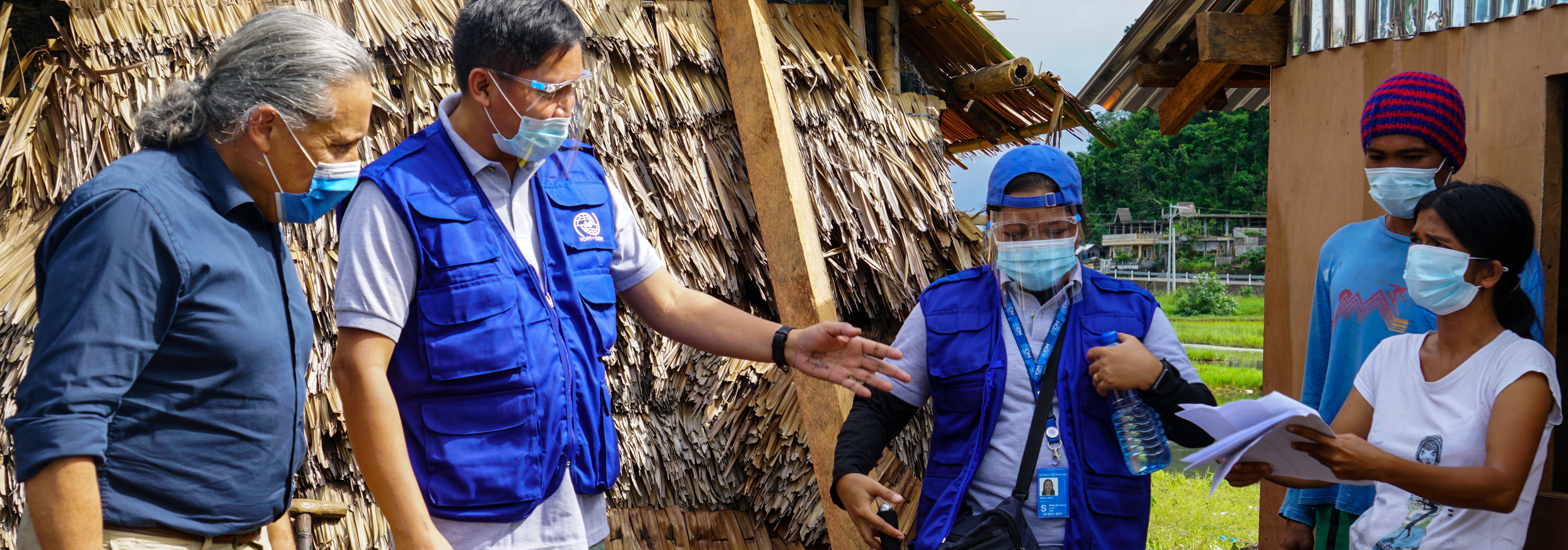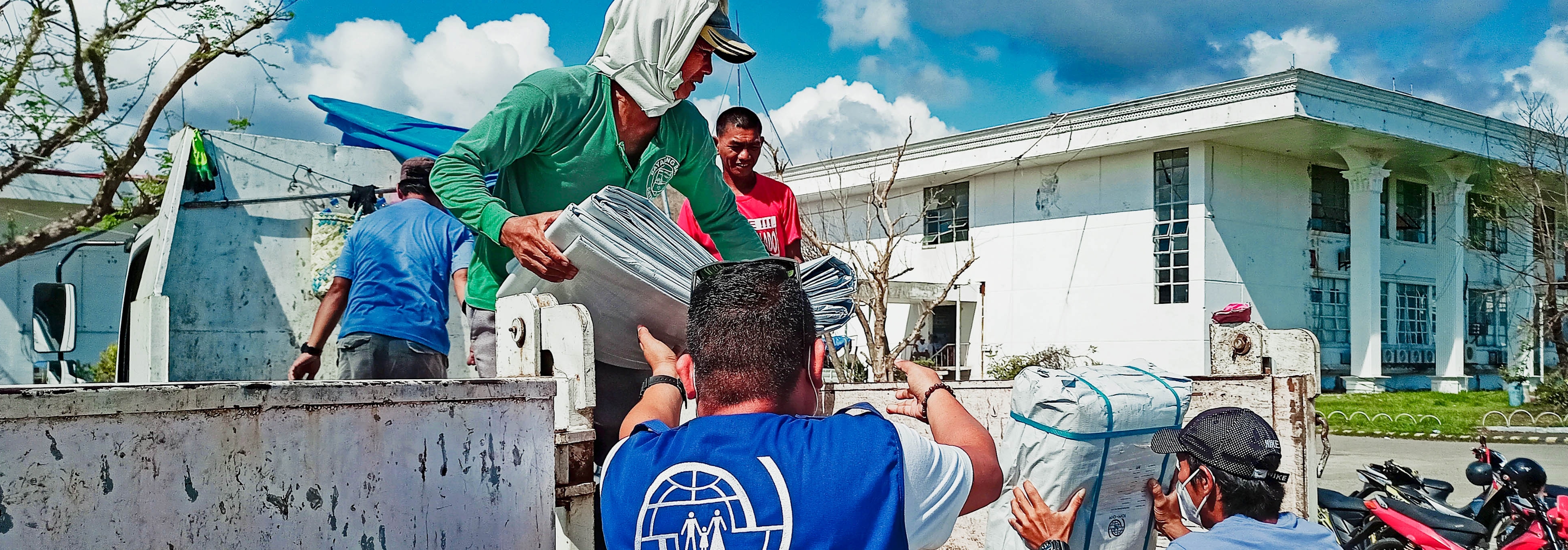IOM Vision
IOM Philippines believes that safe and orderly migration, driven by a migrant's genuine will and choice rather than by necessity, benefits both migrants themselves and the wider society. In line with this vision, IOM will assist the government to achieve the following: assist and protect the most vulnerable populations (including internally displaced persons and mobile populations) affected by the impact of the COVID-19 pandemic; advocating for and implementing urgent actions to combat the climate crisis, focusing on people and communities whose vulnerabilities are further exacerbated by the intensified effect of the climate change; emergency response that addresses the immediate needs of people affected by natural hazards and human-made disasters; improved capacity of governments and communities to effectively anticipate, respond to, and recover from mobility consequences of crisis; and strengthened partnerships to integrate mobility in resilience-building efforts.
Objective
Saving lives and protecting people on the move
|
(1) IDPs that remain in situations of displacement (due to natural hazards, effects of climate crises, and human-made disasters), including IDPs blocked from returning or unwilling to return, IDPs at high risk of protracted displacement; (2) Vulnerable host communities in areas characterized by large levels of displacement and communities of return where services are inadequate or overstretched; (3) IDPs who have returned, but are in need of humanitarian assistance. |
|
IOM will provide camp management support to the local governments in emergency response to the population affected by natural disasters and impacts of climate crises, and man-made disasters. IOM will support the improved camp management and prevention of COVID-19 in displacement sites and host communities in North Cotabato, Davao del Sur, Bicol and Cagayan through:
|
|
IOM will provide mental health and psychosocial support (MHPSS) with a focus on services which ensure protection for the most vulnerable groups. All MHPSS activities will be in line with the IOM Manual on Community-Based Mental Health and Psychosocial Support in Emergencies and Displacement. IOM intends to include MHPSS activities in all emergency response projects in any location, to the extent possible. IOM's interventions will include:
|
|
Assisting families in vulnerable situations, particularly at risk of COVID-19 infection, IOM will provide access to essential services and commodities such as hygiene kits and construction of WASH facilities. These activities are also aimed to improve overall infection prevention and control (not only related to COVID-19), and risk communication and community engagement. IOM's initiatives will include:
|
|
IOM will provide emergency assistance to displaced populations and those impacted by climate crises (locations depending on the specific crisis to which IOM is responding), to improve living conditions so they may live in safety, privacy and dignity. In the context of the COVID-19 pandemic, shelter activities will mainstream health-related considerations (e.g. proper sanitation and social distancing practices during distributions and capacity building training sessions). IOM's initiatives will include:
|

Objective
Driving solutions to displacement
|
(1) IDPs still living in camps requiring a better assessment of their situation and support for safe and sustainable voluntary returns or other durable solutions; (2) Returning Overseas Filipinos and communities in areas of return to access basic services, livelihoods, safety and security; (3) Government authorities and community-based organizations, to contribute to capacity building and facilitate community stabilization; (4) Former combatants (especially women combatants), youth, conflict-affected communities, Indigenous Peoples, traditional and religious groups. |
|
IOM will support vulnerable populations to build resilience and mitigate the socioeconomic impacts of crises, including the COVID pandemic. These activities are also aimed at addressing problems related to diminished livelihoods or food insecurity, and different forms of social exclusion such as limited access to health services and communications. Initiatives will include:
|
IOM will continue to facilitate health systems strengthening efforts in the Philippines, through supporting and bolstering the local health care response, particularly as regards COVID-19 in 2021. To achieve this, IOM will procure and provide critical equipment, alongside overseeing robust capacity building efforts for healthcare workers and relevant personnel, particularly in relation to cold-chain management and logistics in response to COVID-19 and future vaccination efforts. IOM will support the government of the Philippines and its healthcare system by providing:
- Capacity building trainings on topics related to to vaccinations and cold-chain management for the regional government’s Ministry of Health and frontline healthcare workers;
- Supporting procurement of cold-chain vehicles and bio-refrigeration systems as necessary, to ensure proper vaccine roll-out and management to all relevant parts of the country;
- Strengthening testing capacities, such as through the safe and efficient transport of specimens to support the country's disease surveillance efforts.
|
IOM will support key actors in conflict-affected communities in Mindanao with MHPSS activities. These activities aim to not only address MHPSS needs of the affected population but also to promote dialogue and social cohesion towards recovery and crisis prevention. Initiatives will include:
|
|
To mitigate further negative migration pressures resulting from violence and instability, IOM activities will support reconciliation efforts at regional, national and community levels. IOM will strengthen community capacity to promote the peaceful resolution of conflicts so that communities may enjoy the dividends of peace through:
|
|
IOM will serve to restore trust among community members, vulnerable populations and local authorities and lay the foundations for durable solutions, lasting peace and sustainable development. Initiatives will include:
|
Objective
Strengthen preparedness and reduce disaster risk
|
(1) Government of the Philippines, including national and local authorities; (2) Community leaders, to better equip them to deal with disaster management to reduce vulnerabilities; (3) Government and non-governmental actors, such as civil society organizations and community-based organizations, to support their efforts to include and mainstream preparedness, risk reduction, and climate change adaptation. All groups, in particular persons with disabilities, women and elderly will be involved in preparedness activities to ensure the response also addresses their specific needs, concerns and risks that may be exacerbated in the case of a disaster. Those at higher risk of being excluded from accessing information (e.g. women, persons with disabilities) will be involved in these efforts to ensure appropriate means of reaching them with information. |
|
IOM will support in developing the preparedness capacities of government and non-governmental partners in humanitarian response and assisting vulnerable populations, and provide support for populations who are likely to be severely affected by the impact of the climate crisis. Initiatives will include:
|
|
IOM will enhance preparedness through prepositioning key supplies, building local capacity especially on infection, prevention and control (IPC) measures. Initiatives will include:
|
Objective
Contribute to an evidence-based and efficient crisis response system
(1) Government of the Philippines;
(2) Communities;
(3) Crisis response actors.
IOM will collect, analyse and disseminate critical multi-layered information on the mobility, vulnerability, and needs of displaced and mobile populations in the Philippines, using the Displacement Tracking Matrix (DTM) and other customised tools and methodologies, as well as capacity building on data management and processing, response monitoring and accountability mechanisms.
|
IOM collects, analyses and disseminates critical multi-layered information on the mobility, vulnerability, and needs of displaced and mobile populations in the Philippines. The following activities will be considered for implementation in any relevant settings, and the geographical areas and demographic groups and components of the DTM will be determined depending on the context and needs, taking into consideration the existing available data at that point. Initiatives will include:
|
IOM will work in close coordination with the national and local governments in response to various crises. This will include the provision of technical support in the coordination, stockpiling, storage and distribution of critical supplies for response activities, including for COVID-19.
IOM partners with the UN Department of Operational Support (DOS) in order to provide critical health services to eligible UN personnel, dependents, and other persons in need of care referred by the UN, as part of the ‘First Line of Defence (FLOD)’ for the COVID-19 response in the Philippines. IOM’s Migration Health Assessment Clinics (MHACs) provide services in 19 (inclusive of the Philippines) locations. Currently, the IOM Philippines MHAC is authorized to provide testing for SARS-CoV-2.
Philippines
The map used here is for illustration purposes only. Names and boundaries do not imply official endorsement or acceptance by IOM.
Figures are as of 31 December 2023. For more details of IOM's operational capacity in country, please see the IOM Capacity section.










